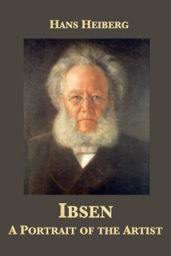 $9.99 on Kindle
$9.99 on KindleIbsen: A Portrait of the Artist by Hans Helberg (translated by Joan Tate; 107,000 words)
“The least pretentious and in its impact the most popular of Henrik Ibsen biographies” according to the National Library of Norway. Hans Heiberg writes in the preface “I have always wanted to read a biography of Henrik Ibsen as a human being — a portrait of the man before he became a mask” and “Let it be said emphatically that this book is not intended for academics [...] It is meant for the enjoyment of people who are interested in Ibsen himself.” Measured in circulation, it seems that Heiberg achieved his goal: the book was published in three editions in Norwegian, and was translated into Swedish, Danish, English, Russian and French — into more languages than any other Ibsen biography.
“Brief and thoroughly readable... this biography is frankly offered ‘for the enjoyment of people who are interested in Ibsen himself.’ Nonetheless, all the basic areas are covered.” — Rolf Fjelde, The New York Times
“In spite of [the biography's] economy, all the essentials are there... Ibsen's quirks of temperament — the violent contrasts in his nature, the combination of troll and moralist, of ancient prophet and shrewd businessman — do not surprise Mr. Heiberg, perhaps because he is himself Norwegian.” — Eva Le Gallienne, Saturday Review
“[Heiberg’s] portrait of Ibsen is crystal clear, the style simple, while every sentence is meaningful... Heiberg is... an outstanding storyteller, in the descriptions of Ibsen’s family and environment, his childhood and youth, in adversity, development and achievement.” — Farmand
“Hans Heiberg’s portrait... has a fresh and personal angle... it is wisely crafted in the details, honest and straightforward... the individual Ibsen stands at its core — with his personal fallibilities and ridiculous characteristics, and precisely therefore also in all his greatness.” — Drammens Tidende and Buskerud’s Magazine
“In Ibsen: A Portrait of the Artist, [Heiberg] has intended to draw a portrait of the man behind the artwork. What was he like? And how did he become the way he was?... One can call Ibsen: A Portrait of the Artist a novel, a relation of André Maurois’ well-known biographies of famous men and women, but... Heiberg never invents things which may or may not have happened. He sticks to what he knows or what he is fully justified in believing.” — Arbeiderbladet



